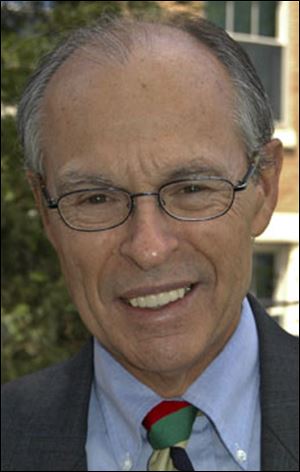
Study finds faith key to aging positively
Psychologist to lead workshop in Sylvania
4/28/2012
Dr. Richard Johnson.
Why do some 94-year-olds seem to possess an eternal vitality, while others half their age act like the walking dead?
That question spurred Richard Johnson, a psychologist, author, and pioneer in spiritual gerontology, to undertake a four-year research project that found 50 factors distinguishing positive from negative aging.
Boiling it all down, he said, the main difference is faith.
"I was trying to look at this from a behavioral scientist viewpoint and not looking for a spiritual spin, but that's what certainly came out of this," Mr. Johnson said in an interview this week from St. Louis. "If there's any distinguishing thread between a 49-year-old who seems old and a 94-year-old who seems young, it's the spiritual spin."
Mr. Johnson will be in Sylvania Wednesday to discuss the spiritual aspects of aging in a workshop titled "Finding God in the Later Years."
"The later years are essentially a spiritual journey," he said. "Certainly there are physical aspects to it, emotional aspects to it, psychological aspects to it, which all have to be attended to. But if that spiritual component is missing, then aging becomes really a very dismal thing. Because all we are looking at is the demise of the body."
Mr. Johnson, 65, who has a doctorate in psychology from the University of Florida, said he found a sociology textbook from the 1980s that offers this shockingly bleak definition of aging: "a senseless slipping into nothingness."
Without faith, that definition is all too accurate, he said. Research has been unable to find a reason why people age, so it can be considered senseless, he said, and physically, as people age they "slip down a rocky slope that sometimes gets more than slippery." The final step, death, can translate into "nothingness" if there's no spiritual hope, he said.
Yet in light of the fact that most surveys show that 96 percent of Americans profess some form of faith, Mr. Johnson said his goal is to help people apply their spirituality to achieve "optimal aging."
"What we're trying to do is accent the centrality of one's faith in the whole wellness mix," he said.
And it's not just faith in the broad sense that makes an impact, but it hinges on whether people have extrinsic or intrinsic faith, Mr. Johnson said. Extrinsic faith is simply going to a house of worship and "going through the motions" to do what is expected. Intrinsic faith, on the other hand, is a determining factor in a person's every thought and deed.
Some things that have a positive impact on someone's outlook on life are not necessarily spiritual, Mr. Johnson said, but are often found in spirituality and religion.
"Giving to others came up as a big one," he said. "Offering oneself to others. You can look at a lot of psychological research and see that helping other people is one of the best ways of helping yourself."
Other traits that lead to aging well include being malleable, flexible, adaptable, and forgiving.
"Letting go of grudges is a big one," Mr. Johnson said, citing an old maxim that "holding a grudge is like drinking a glass of poison and thinking that the other guy's going to die."
But the single-biggest element to aging well is changing one's attitude, he said.
In researching aging and attitude, he said he was surprised at the importance of "being able to grow in the face of loss."
People are inclined to try to avoid loss, he said, and "we do everything we can to get away from it."
But loss is a big part of life, and adapting to loss can lead to personal growth. It may seem paradoxical, but "we only grow when we lose," Mr. Johnson said, citing research by author Judith Viorst.
In other words, he said, it's better to accept and be challenged by loss than to feel threatened and adopt an overall defensive posture in life.
"How are you believing? How are you perceiving? What data are you focusing on? It's very clear that pessimists don't age well.
"They may live years, but their life satisfaction -- the psychologists' code for 'happiness' -- is low. They become the curmudgeons, the crotchety old men.
"The happiest person alive is the one who knows how to extend enabling feelings and to extinguish negative feelings. Aging is hard work. Aging is not for sissies," Mr. Johnson said.
Richard Johnson will present "Finding God in the Later Years" in two sessions Wednesday, 9:30 a.m. to 12 p.m. and 1 to 3:30 p.m., in the Franciscan Center at Sylvania Franciscan Village, 6832 Convent Blvd., Sylvania. The cost is $20 in advance or $25 at the door, including lunch, or $10 for one session and no lunch. Information and registration are available by calling 419-824-3533 or online at sistersosf.org.